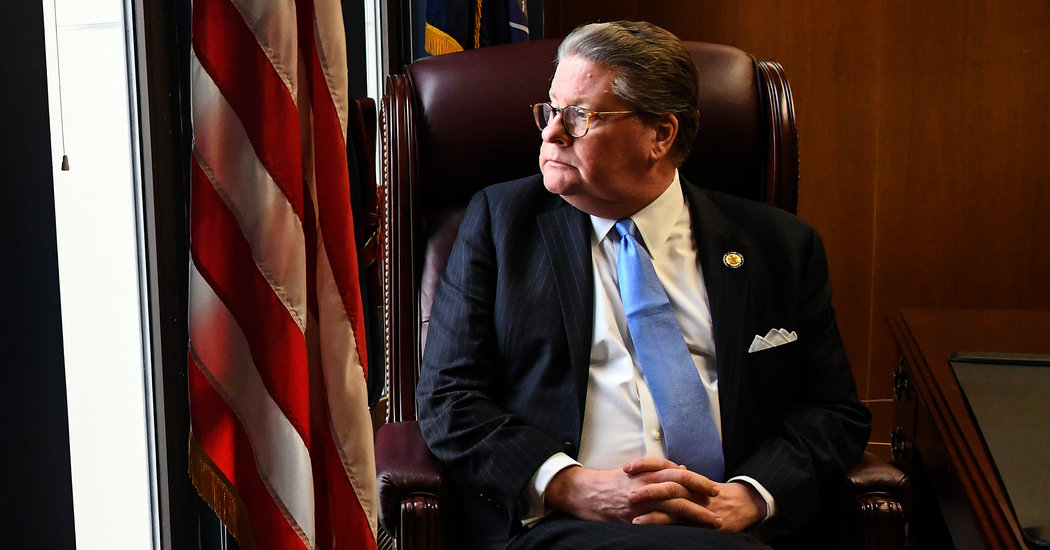‘Get Well or Die’: A State Senator Reveals His Addiction Battle


Cindy Schultz for The New York Times
ALBANY, N.Y. — The startling disclosure came two minutes into a State Capitol news conference.
State Senator Peter Harckham, a first-term Democratic lawmaker, announced his support for legalizing recreational marijuana, but he first acknowledged his own struggles with addiction.
“As someone in recovery myself for many years, I look at it from that lens,” Mr. Harckham said last month.
“As someone in recovery, my job in life is not to outlaw every mood-altering chemical on the planet,” he said. “My job in life is to learn how to navigate that environment in a sober manner and help others do the same.”
He introduced five of the 17 bills the State Senate passed last Tuesday to fight drug abuse and the scourge of overdose deaths. The raft of bills is aimed at plugging a series of holes in the way opioids are prescribed, health providers are trained and naloxone — a drug that can reverse overdoses — is distributed.
Mr. Harckham’s frankness about his struggle with substance abuse, and how it had influenced his stance on one of the most hotly debated issues in Albany, came as a surprise to many in the capital.
It marked the first time that Mr. Harckham had spoken publicly about his drug misuse since being elected to the Senate as part of the so-called blue wave that propelled Democrats to the helm of the Legislature in 2018.
In a capital where lawmakers are either protective of the intimate details of their lives or strategic in the personal disclosures they make, Mr. Harckham’s decision to make public one of the darkest periods of his life did not come lightly.
But it was deliberate.
“Stigma is still the largest challenge that we face,” Mr. Harckham, 59, said in an interview this week in his legislative office. “It prevents people from coming into treatment. The moment was right. If we’re talking about ending stigma, people like myself have to speak up.”
He added, “The older I get it’s like, ‘Screw it, I don’t care what people think.’”
His personal remarks were not a revelation to those closest to the first-term senator, but they cast his legislative efforts in a new light.
Mr. Harckham, who represents parts of Westchester County and the Hudson Valley, is chairman of the committee on alcoholism and substance abuse and helps lead a bipartisan task force charged with combating New York’s deepening opioid epidemic.
Mr. Harckham said he has been sober for almost 33 years after becoming addicted to alcohol and drugs — “all of them” — at “a very early age.”
“I was a bit of a wreck,” he said with a slight chuckle. “I was a whirling dervish.”
Mr. Harckham said he “started bottoming out” in the 80s, during his 20s.
He had recently graduated from college and, English degree in hand, moved to New York City to work in advertising on Madison Avenue, handling big-name accounts like Procter & Gamble and Prell, the shampoo brand.
He relapsed the first time he sought treatment. Then, he said, he began to lose it all: his job, his friends, his family.
“In the beginning it was people around me saying, ‘You have a problem,’” he said. “It was family members, it was friends, it was co-workers, but it wasn’t until I was nearly suicidal that I wanted to get treatment.
“I personally had to hit rock bottom,” he said. “It was either start to get well or die.”
In 1987, he spent about five weeks in a rehabilitation center in Pennsylvania, detoxing first (“I just sweated for three straight days”), and later receiving treatment. He moved back to New York, where he sobered up through the 12-step program with support from a tight-knit network of sponsors.
Eventually, he married, had children, moved to the suburbs, founded his own advertising company and later presided over a nonprofit that develops affordable housing before entering politics.
“I think the key for people to know is that there is life on the other side of their substance use disorder,” Mr. Harckham said. “Showing up for life, you can deal with things. I’ve dealt with adversity in sobriety.”
He acknowledges he had certain advantages during his recovery — a job, health insurance, stable housing and a steady support network — that many do not. Giving others a fighting chance like the one he had has been his impetus in the Senate.
Last year, the governor signed his legislation to increase access to health insurance coverage for substance abuse treatment.
“There were a lot of people I started getting sober with who we lost,” he said. “It’s a pernicious disease. Can we save everyone? I don’t think we can. The more people we can save, that’s our moral responsibility as elected officials.”
The opioid epidemic has ravaged both urban and rural communities across New York. All levels of government have thrown money at the public health crisis, increasing access to lifesaving tools like naloxone and funding prevention, treatment and recovery efforts.
In New York, the number of deaths from an opioid-related overdose dipped recently — from 3,652 in 2017 to 3,268 in 2018 — but that’s still more than twice the total number a decade ago.
On Tuesday, during a news conference in which legislators from the opioid task force unveiled additional policy recommendations following a series of statewide public hearings, Mr. Harckham did not mention his history of substance abuse.
But he choked up toward the end of his remarks.
Then, Senator Gustavo Rivera, a Democrat, took his turn at the lectern.
“Addiction is not a moral failing,” Mr. Rivera said. “I’ll repeat, addiction is not a moral failing.”
Mr. Harckham silently nodded.
 Pathways Drug Rehabilitation Luxury Addiction Treatment & Detox Center
Pathways Drug Rehabilitation Luxury Addiction Treatment & Detox Center


